2026年中考《英语》复习课件:专题二 第5讲 Units 4~6(共53张PPT)
文档属性
| 名称 | 2026年中考《英语》复习课件:专题二 第5讲 Units 4~6(共53张PPT) |

|
|
| 格式 | pptx | ||
| 文件大小 | 339.0KB | ||
| 资源类型 | 教案 | ||
| 版本资源 | 人教新目标(Go for it)版 | ||
| 科目 | 英语 | ||
| 更新时间 | 2025-07-17 10:45:20 | ||
图片预览

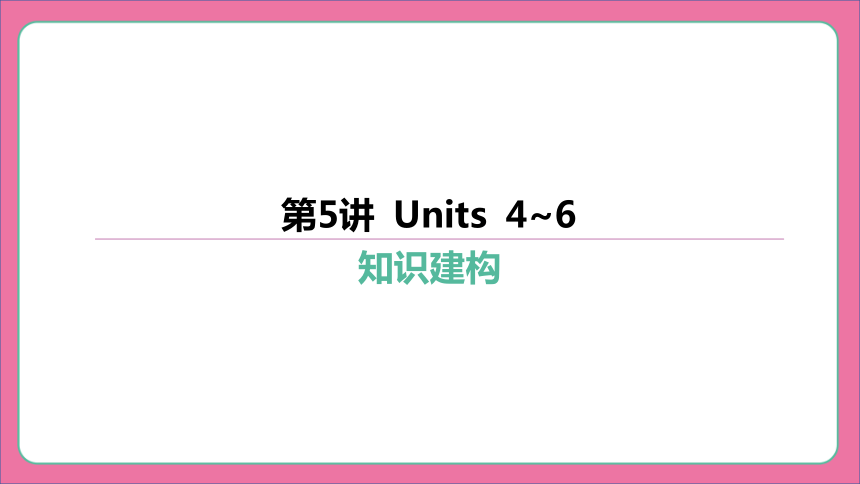
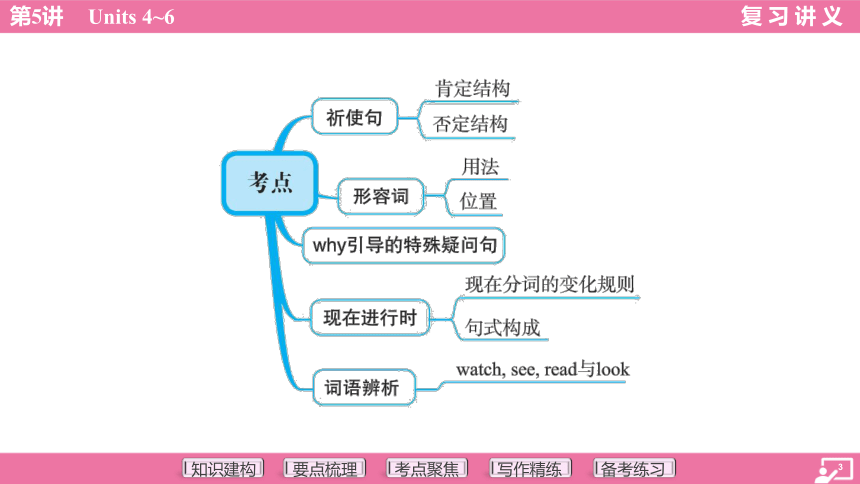
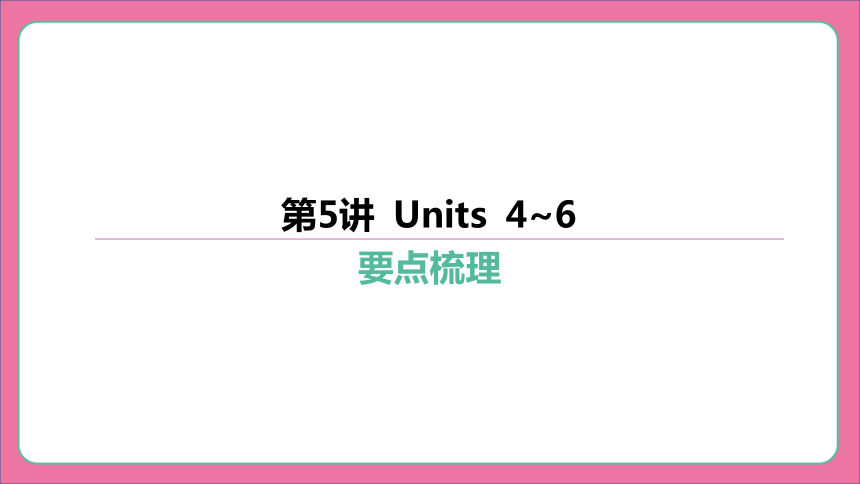
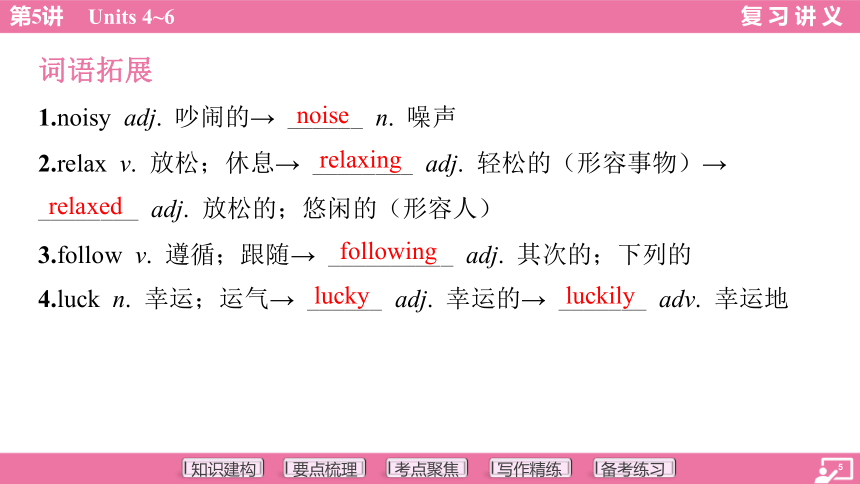
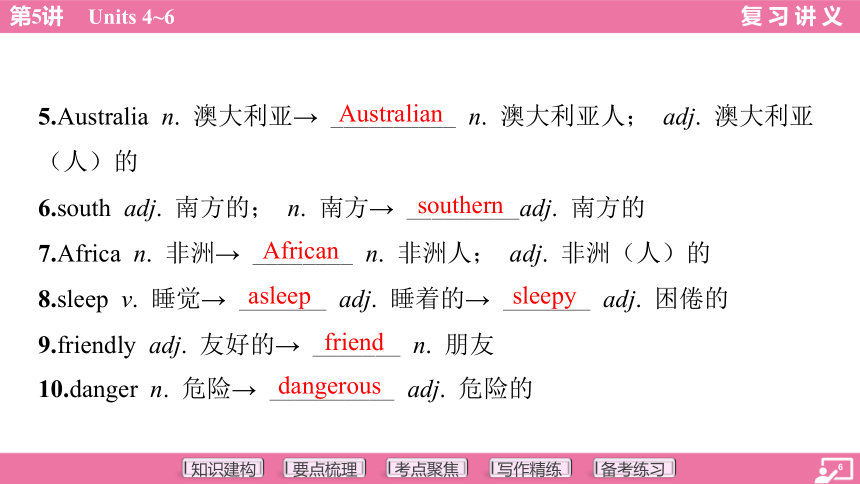
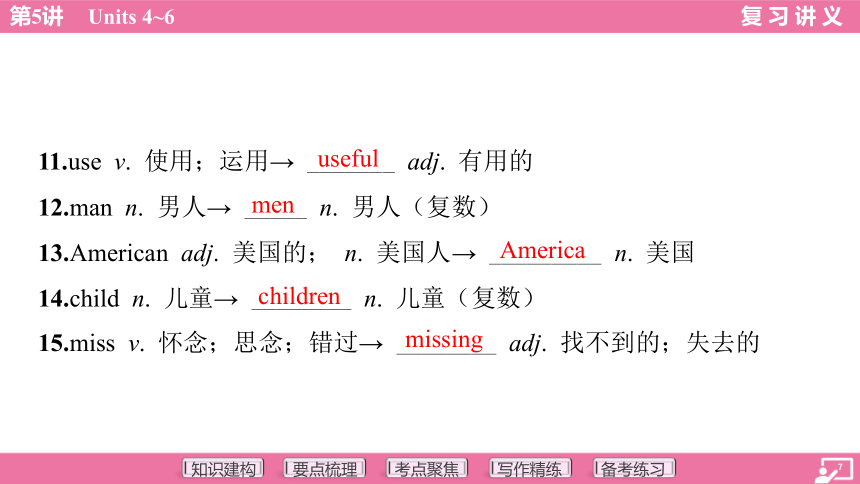
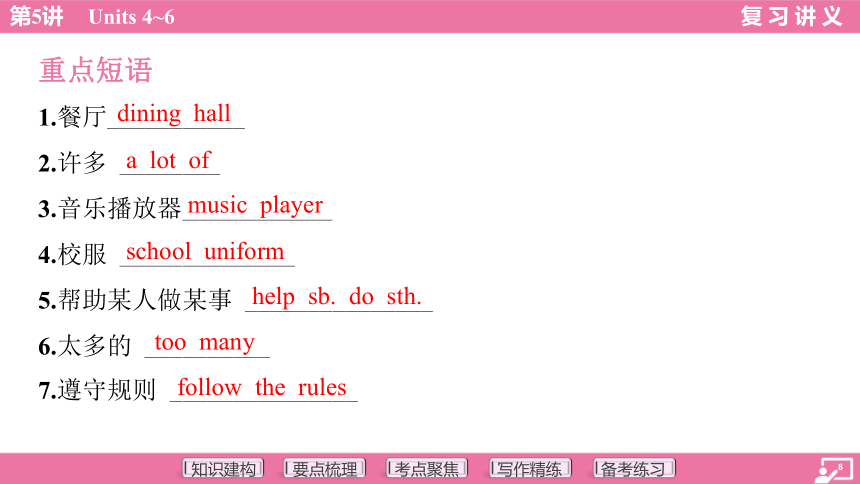
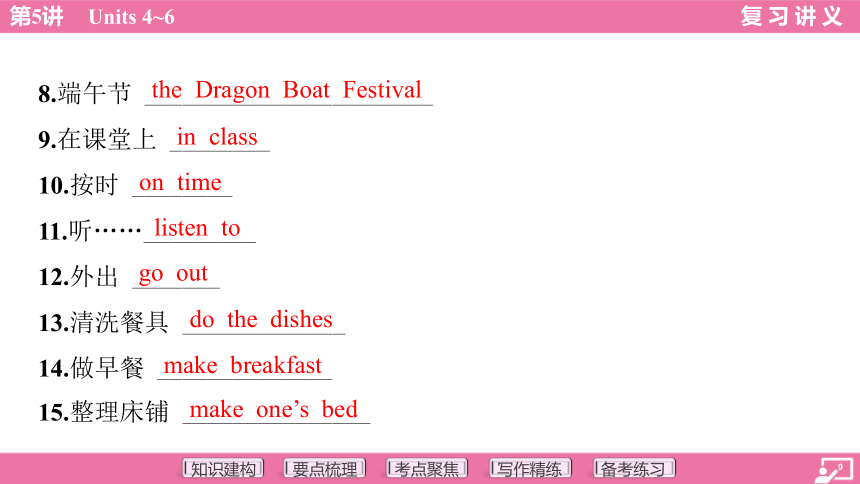
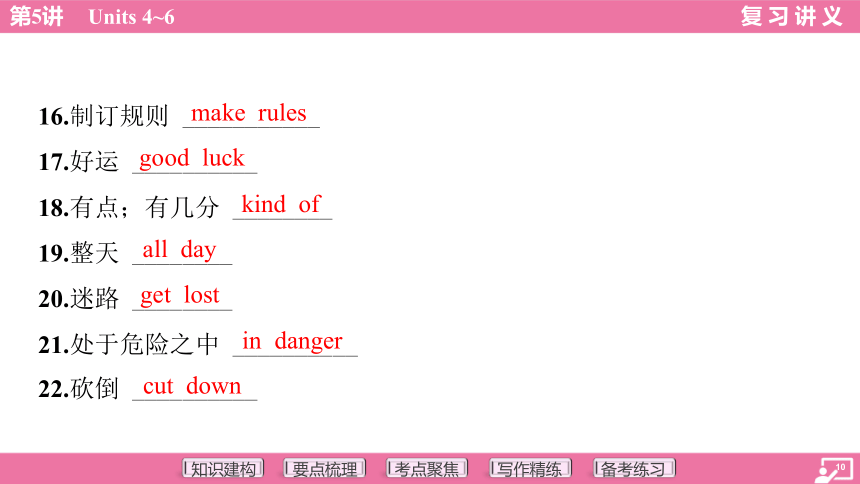
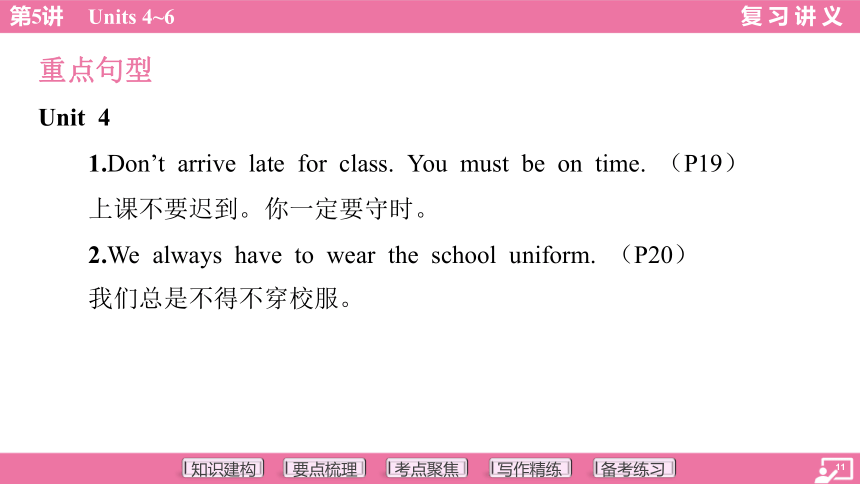
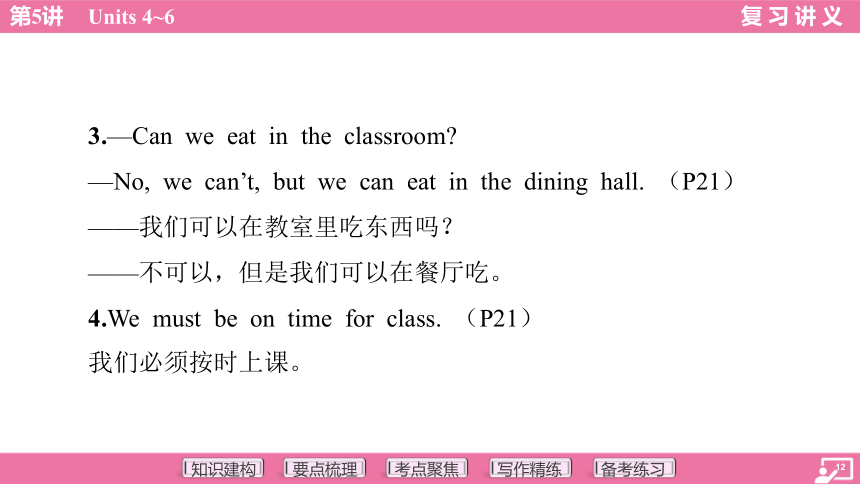
文档简介
(共53张PPT)
复 习 讲 义
第一篇 基础过关
第二部分 七年级下册
第5讲 Units 4~6
知识建构
第5讲 Units 4~6
要点梳理
词语拓展
1.noisy adj. 吵闹的→ ______ n. 噪声
2.relax v. 放松;休息→ ________ adj. 轻松的(形容事物)→
________ adj. 放松的;悠闲的(形容人)
3.follow v. 遵循;跟随→ __________ adj. 其次的;下列的
4.luck n. 幸运;运气→ ______ adj. 幸运的→ _______ adv. 幸运地
noise
relaxing
relaxed
following
lucky
luckily
5.Australia n. 澳大利亚→ __________ n. 澳大利亚人; adj. 澳大利亚
(人)的
6.south adj. 南方的; n. 南方→ _________adj. 南方的
7.Africa n. 非洲→ ________ n. 非洲人; adj. 非洲(人)的
8.sleep v. 睡觉→ _______ adj. 睡着的→ _______ adj. 困倦的
9.friendly adj. 友好的→ _______ n. 朋友
10.danger n. 危险→ __________ adj. 危险的
Australian
southern
African
asleep
sleepy
friend
dangerous
11.use v. 使用;运用→ _______ adj. 有用的
12.man n. 男人→ _____ n. 男人(复数)
13.American adj. 美国的; n. 美国人→ _________ n. 美国
14.child n. 儿童→ ________ n. 儿童(复数)
15.miss v. 怀念;思念;错过→ ________ adj. 找不到的;失去的
useful
men
America
children
missing
重点短语
1.餐厅___________
2.许多 ________
3.音乐播放器____________
4.校服 ______________
5.帮助某人做某事 _______________
6.太多的 __________
7.遵守规则 _______________
dining hall
a lot of
music player
school uniform
help sb. do sth.
too many
follow the rules
8.端午节 _______________________
9.在课堂上 ________
10.按时 ________
11.听……_________
12.外出 _______
13.清洗餐具 _____________
14.做早餐 ______________
15.整理床铺 _______________
the Dragon Boat Festival
in class
on time
listen to
go out
do the dishes
make breakfast
make one’s bed
16.制订规则 ___________
17.好运 __________
18.有点;有几分 ________
19.整天 ________
20.迷路 ________
21.处于危险之中 __________
22.砍倒 __________
make rules
good luck
kind of
all day
get lost
in danger
cut down
重点句型
Unit 4
1.Don’t arrive late for class. You must be on time. (P19)
上课不要迟到。你一定要守时。
2.We always have to wear the school uniform. (P20)
我们总是不得不穿校服。
3.—Can we eat in the classroom
—No, we can’t, but we can eat in the dining hall. (P21)
——我们可以在教室里吃东西吗?
——不可以,但是我们可以在餐厅吃。
4.We must be on time for class. (P21)
我们必须按时上课。
Unit 5
5.—Why do you like pandas
—Because they’re kind of interesting. (P27)
——你为什么喜欢熊猫
——因为它们有点儿有趣。
6.—Where are lions from
—They’re from South Africa. (P27)
——狮子来自哪里?
——它们来自南非。
7.The elephant is one of Thailand’s symbols. (P29)
大象是泰国的象征之一。
Unit 6
8.—What are you doing
—I’m watching TV. (P31)
——你在做什么?
——我在看电视。
9.—Hello This is Jenny.
—Hi, Jenny. It’s Laura here. (P32)
——喂?我是詹妮。
——嗨,詹妮。我是劳拉。
10.—Is he reading a newspaper
—Yes, he is./No, he isn’t. He’s playing basketball. (P33)
——他在看报纸吗?
——是的,他在看报。/不,他不在看报。他在打篮球。
第5讲 Units 4~6
考点聚焦
考点1 祈使句。
祈使句用来表达命令、要求、请求等语气。祈使句的谓语动词没有
时态、数的变化。
1.祈使句的肯定结构。
(1)Be+形容词/名词. 例如:
Be quiet, please. 请安静。
(2)实义动词原形+其他成分. 例如:
Open your books. 打开你们的书。
(3)Let+宾语+动词原形+其他成分. 例如:
Let’s go to the zoo. 我们去动物园吧。
2.祈使句的否定结构。
(1)Don’t+动词原形. 例如:
Don’t eat in the library. 不要在图书馆里吃东西。
(2)Let’s+not+动词原形. 例如:
Let’s not say anything about it. 让我们守口如瓶。
考点精练
1.Let’s ____ (go) for a walk, shall we
2.It smells terrible. Tom, ____ (put) away your shoes and wash
them at once.
3.______ ____ (not be)so nervous (别紧张). Take it easy.
go
put
Don’t
be
考点2 形容词。
形容词用于修饰名词,用以说明事物或人的性质、特征,通常在句
中作定语和表语。
1.形容词的用法。
(1)作定语,修饰名词。例如:
Meimei is a clever girl.梅梅是个聪明的女孩。
(2)作表语,表示主语的状态或特征。例如:
Gina is happy every day.吉娜每天都很开心。
2.形容词的位置。
(1)一般放在被修饰的名词前,置于系动词之后。例如:
There is a big tree in front of our teaching building. 我们教学楼
前面有一棵大树。
I’m very busy now. 我现在很忙。
(2)多个形容词作定语时,记住“限观形龄颜国材”的排序。
限:限定词, 包括冠词、指示代词、形容词性物主代词、名词所有
格、数词等。
观:表示观点的描述性形容词,如fine, beautiful, interesting等。
形:表示大小、长短、高低及形状的形容词,如small, tall, high,
round等。
龄:表示年龄、新旧的形容词,如young,old, new等。
颜:表示颜色的形容词,如red,black,white等。
国:表示国籍、地区、出处的形容词(或名词),如 English,
American等。
材:表示中心名词的构成材料的形容词,如wooden, stone,
plastic等。例如:
There is a small old brown wooden desk in my bedroom. 在我的
卧室里有一张又小又旧的棕色木桌。
考点精练
1.Don’t run in the hallways. It’s __________ (danger).
2.It’s good for us to eat more ________ (health) food, like fruit
and vegetables.
dangerous
healthy
考点3 why引导的特殊疑问句。
why引导的特殊疑问句,表示询问某件事情的原因,相当于
“what...for”,需要用because引导的原因状语从句来回答。例如:
—Why do you like pandas 你为什么喜欢熊猫?
—Because they are cute. 因为它们很可爱。
考点精练
1.—Why is the street crowded with so many people
—________ they are waiting to watch the boat races.( )
B
A.So B.Because C.And
2.—Tony, ________ are you in such a hurry
—The meeting will start soon. I don’t want to be late.( )
C
A.where B.how C.why
考点4 现在进行时。
现在进行时表示现在或当前一段时间正在进行的动作,常与now,
these days等时间状语连用。其构成形式为“主语+am/is/are+动词的现在
分词.”。
1.动词的现在分词的变化规则。
规 则 例 词
一般在动词词尾加-ing go—going cook—cooking
以不发音的字母e结尾的动词, 先去掉e, 再加-ing give—giving
move—moving
以重读闭音节结尾的动词, 如结尾只有 一个辅音字母, 应先双写这一辅音字母, 再加-ing sit—sitting put—putting
2.现在进行时的句式构成。
(1)肯定句:主语+am/is/are+动词的现在分词. 例如:
Jim is reading a book in his room. 吉姆正在房间里读书。
(2)否定句:主语+am/is/are+not+动词的现在分词. 例如:
My father is not watching TV now. 我爸爸现在没在看电视。
(3)一般疑问句:Am/Is/Are+主语+动词的现在分词 例如:
Are they playing games in the park 他们正在公园里做游戏吗?
考点精练
1.—May I speak to the headmaster
—He ________ a meeting now. Can I take a message ( )
A
A.is having B.had C.has
2.—Mum, I can’t find my shoes.
—Hurry up! Your father ________for us.( )
C
A.waits B.waited C.is waiting
考点5 watch, see, read和look的用法区别。
单词 词义 区 别 例 句
watch 观看 指观看表演、比 赛、节目等 Would you like watching the
football match with me tomorrow
你明天愿意和我一起去看足球比赛
吗?
see 看见 指看的结果,看到 了某些事情/事物 I saw him playing basketball on
the playground. 我看见他在操场上
打篮球。
单词 词义 区 别 例 句
read 看书 指“读书” I like reading very much.我非常喜
欢阅读。Listen! The students are
reading English loudly.听!孩子们
正在大声朗读英语。
look 看 指“看”这一动作 Look at the blackboard, please.请
看黑板。
续表
考点精练
see watch look read
1.______ at this picture. It’s beautiful.
2.My brother is ________ newspapers in his room.
3.I like _________ football games.
4.What can you ____ in the room
Look
reading
watching
see
第5讲 Units 4~6
写作精练
主题:规则礼仪
写作精练
假如你是李华,你准备参加学校组织的英语夏令营(summer camp)。你和你的英国朋友Tom在网上聊天时,他向你询问了有关这次夏令营的情况。请你根据以下内容提示,写一篇英语短文,向他简单介绍一下营中的一些规章制度,并谈谈你对此的看法。
内容提示:
1.必须早上6:30起床,晚上9:00睡觉;
2.必须每天整理房间;
3.必须说英语;
4.没有得到允许(without permission),不能随便外出。
写作要求:
1.80词左右。开头已给出,不计入总词数;
2.短文需包括以上提示内容,也可以适当发挥。
It’s a one-week summer camp, from June 10th to June 16th.
There are 50 students in the camp.________________________________ __________________________________________________________________________________________________________________________________________________________________________________________________________________________________________________________________________________________________________________________________________________________________________________________________________________________
First, we have to get up at 6:30 am. and go to bed at 9:00 pm.
Second, we also have to make our rooms clean and tidy every day.
Third, to improve our spoken English, everyone must speak English in
the summer camp. And we cannot go out without permission.
Some rules are strict, but I think they are necessary and important
to us. We should follow the rules.
There are quite a few rules for us to follow in the English summer camp.
审题谋篇
审主题 夏令营中的一些规章制度
审人称 第一人称
审时态 一般现在时
审要点 ①必须早上6:30起床,晚上9:00睡觉;每天整理房间
②必须说英语
③没有得到允许(without permission),不能随便外出
审结构 开篇:点明主题
中间:介绍营中的一些规章制度
结尾:谈谈你对此的看法
常用词句 [词语]
get up, make our rooms clean and tidy, be strict
[句型]
①There are quite a few rules for us to follow in the
English summer camp.
②We should follow the rules.
续表
学习至此,请完成第5讲备考练习(第195页)
第5讲 Units 4~6
第5讲备考练习(七年级下册Units 4~6)
一、单项选择。
1.There is only ________ elephant in the small zoo. ________ elephant
is from Thailand.( )
A
A.an; The B.an; An C.a; An
2.________ smoke here, Dad. Smoking has been banned in public
places.( )
B
A.Don’t be B.Don’t C.Not to be
3.I want to buy some apples ________ they taste good.( )
B
A.and B.because C.so
4.I like to listen to ________ music. It helps me ________.( )
A
A.relaxing; relax B.relaxing; relaxing C.relax; relax
5.In some places, people ________ trees every year,so many animals
are losing their homes.( )
B
A.talk to B.cut down C.think of
6.________ exercising, and you’ll be healthier.( )
A
A.Keep B.To keep C.Keeping
7.—Don’t ________ to play soccer with me this afternoon.
—OK. See you then.( )
C
A.like B.stop C.forget
8.—Where’s your dad
—He ________ outside. He ________ for an hour every day.( )
C
A.runs; exercises
B.runs; is exercising
C.is running; exercises
9.I wish ________ to the movies with Daniel this weekend.( )
A
A.to go B.going C.to come
10.—Are your cousins swimming
—________ They’re taking a shower.( )
B
A.Yes, they are. B.No, they aren’t. C.No, they don’t.
二、用括号内所给单词的正确形式填空。
1.Can I ____(use)your eraser I can’t find mine.
2.Rick is good with his classmates. He never ______(fight)with
them.
3.Betty sometimes ______(read)books in the school library.
4.Don’t be _____ (lazy). It’s time to do some exercise.
5.Linda _________ (practice)the violin for two hours every day.
6.He is very good with ________(child).
use
fights
reads
lazy
practices
children
7.—Do you think tigers look like big _____(cat)
—Yes, they’re in the same family.
cats
8.I know that girl, but I can’t __________ (remember) her name.
9.My father usually ______(read) a newspaper after dinner, but now
he ___________(watch) a soccer game on TV.
remember
reads
is watching
10.—What are you doing, Jack
—Not much. I’m just _________(listen)to music.
listening
三、从方框中选择恰当的单词,并用其正确形式填空。每个单
词只能用一次。
get noise they open perhaps
however pass lonely prefer child
Do you ever wish that your neighbours would turn down their
music Perhaps you’re trying to sleep and you wish that the people
next-door were not holding an all-night party in 1._____ garden. Or do
you feel it’s time for you to move to a(n) 2._______ island Don’t
worry—you are just another victim(受害者) of 3.______ pollution.
their
lonely
noise
Of course, most people may 4._______ the cars make no noise at
all. Neighbours may be as quiet as mice, and nobody would drive the
cars with 5.______ windows and noisy sound systems. You may even
wish you could stop 6.________ from playing in the street, or planes
from 7.________ overhead.
If I were you, 8._________, I would just get used to it. Close the
windows, 9.____ some earplugs(耳塞), laugh and turn up the music
player. Just act as if the noise were simply not there! Who knows,
10.________ it will go away!
prefer
open
children
passing
however
get
perhaps
get noise they open perhaps
however pass lonely prefer child
四、阅读理解。
Dear Lisa,
How are you Do you know where I am now I’m at my uncle’s
home. And I have a great time! My parents are very strict with me,
but Uncle Peter isn’t. He lets me do what I want!
My parents always ask me to do my homework right after school,
but Uncle Peter lets me relax first. And I can have my dinner on the
sofa. Mom always asks me to eat at the table and she doesn’t let me
watch TV when I am eating. Dad asks me to go to bed before 9:00
pm. At my uncle’s home I can go to bed at 10:00 pm.
And I can invite friends over this weekend. Do you want to come
here on Saturday evening to play games
Write to me soon.
Yours,
Scott
根据短文内容,判断下列句子的正(T)误(F)。
1.Scott’s uncle isn’t strict with him.( )
T
2.Scott’s uncle asks him to relax first after school.( )
T
3.Scott can watch TV when he is eating at his home.( )
F
4.Scott’s uncle asks him to go to bed before nine o’clock.( )
F
5.Scott invites Lisa to play games this Saturday.( )
T
复 习 讲 义
第一篇 基础过关
第二部分 七年级下册
第5讲 Units 4~6
知识建构
第5讲 Units 4~6
要点梳理
词语拓展
1.noisy adj. 吵闹的→ ______ n. 噪声
2.relax v. 放松;休息→ ________ adj. 轻松的(形容事物)→
________ adj. 放松的;悠闲的(形容人)
3.follow v. 遵循;跟随→ __________ adj. 其次的;下列的
4.luck n. 幸运;运气→ ______ adj. 幸运的→ _______ adv. 幸运地
noise
relaxing
relaxed
following
lucky
luckily
5.Australia n. 澳大利亚→ __________ n. 澳大利亚人; adj. 澳大利亚
(人)的
6.south adj. 南方的; n. 南方→ _________adj. 南方的
7.Africa n. 非洲→ ________ n. 非洲人; adj. 非洲(人)的
8.sleep v. 睡觉→ _______ adj. 睡着的→ _______ adj. 困倦的
9.friendly adj. 友好的→ _______ n. 朋友
10.danger n. 危险→ __________ adj. 危险的
Australian
southern
African
asleep
sleepy
friend
dangerous
11.use v. 使用;运用→ _______ adj. 有用的
12.man n. 男人→ _____ n. 男人(复数)
13.American adj. 美国的; n. 美国人→ _________ n. 美国
14.child n. 儿童→ ________ n. 儿童(复数)
15.miss v. 怀念;思念;错过→ ________ adj. 找不到的;失去的
useful
men
America
children
missing
重点短语
1.餐厅___________
2.许多 ________
3.音乐播放器____________
4.校服 ______________
5.帮助某人做某事 _______________
6.太多的 __________
7.遵守规则 _______________
dining hall
a lot of
music player
school uniform
help sb. do sth.
too many
follow the rules
8.端午节 _______________________
9.在课堂上 ________
10.按时 ________
11.听……_________
12.外出 _______
13.清洗餐具 _____________
14.做早餐 ______________
15.整理床铺 _______________
the Dragon Boat Festival
in class
on time
listen to
go out
do the dishes
make breakfast
make one’s bed
16.制订规则 ___________
17.好运 __________
18.有点;有几分 ________
19.整天 ________
20.迷路 ________
21.处于危险之中 __________
22.砍倒 __________
make rules
good luck
kind of
all day
get lost
in danger
cut down
重点句型
Unit 4
1.Don’t arrive late for class. You must be on time. (P19)
上课不要迟到。你一定要守时。
2.We always have to wear the school uniform. (P20)
我们总是不得不穿校服。
3.—Can we eat in the classroom
—No, we can’t, but we can eat in the dining hall. (P21)
——我们可以在教室里吃东西吗?
——不可以,但是我们可以在餐厅吃。
4.We must be on time for class. (P21)
我们必须按时上课。
Unit 5
5.—Why do you like pandas
—Because they’re kind of interesting. (P27)
——你为什么喜欢熊猫
——因为它们有点儿有趣。
6.—Where are lions from
—They’re from South Africa. (P27)
——狮子来自哪里?
——它们来自南非。
7.The elephant is one of Thailand’s symbols. (P29)
大象是泰国的象征之一。
Unit 6
8.—What are you doing
—I’m watching TV. (P31)
——你在做什么?
——我在看电视。
9.—Hello This is Jenny.
—Hi, Jenny. It’s Laura here. (P32)
——喂?我是詹妮。
——嗨,詹妮。我是劳拉。
10.—Is he reading a newspaper
—Yes, he is./No, he isn’t. He’s playing basketball. (P33)
——他在看报纸吗?
——是的,他在看报。/不,他不在看报。他在打篮球。
第5讲 Units 4~6
考点聚焦
考点1 祈使句。
祈使句用来表达命令、要求、请求等语气。祈使句的谓语动词没有
时态、数的变化。
1.祈使句的肯定结构。
(1)Be+形容词/名词. 例如:
Be quiet, please. 请安静。
(2)实义动词原形+其他成分. 例如:
Open your books. 打开你们的书。
(3)Let+宾语+动词原形+其他成分. 例如:
Let’s go to the zoo. 我们去动物园吧。
2.祈使句的否定结构。
(1)Don’t+动词原形. 例如:
Don’t eat in the library. 不要在图书馆里吃东西。
(2)Let’s+not+动词原形. 例如:
Let’s not say anything about it. 让我们守口如瓶。
考点精练
1.Let’s ____ (go) for a walk, shall we
2.It smells terrible. Tom, ____ (put) away your shoes and wash
them at once.
3.______ ____ (not be)so nervous (别紧张). Take it easy.
go
put
Don’t
be
考点2 形容词。
形容词用于修饰名词,用以说明事物或人的性质、特征,通常在句
中作定语和表语。
1.形容词的用法。
(1)作定语,修饰名词。例如:
Meimei is a clever girl.梅梅是个聪明的女孩。
(2)作表语,表示主语的状态或特征。例如:
Gina is happy every day.吉娜每天都很开心。
2.形容词的位置。
(1)一般放在被修饰的名词前,置于系动词之后。例如:
There is a big tree in front of our teaching building. 我们教学楼
前面有一棵大树。
I’m very busy now. 我现在很忙。
(2)多个形容词作定语时,记住“限观形龄颜国材”的排序。
限:限定词, 包括冠词、指示代词、形容词性物主代词、名词所有
格、数词等。
观:表示观点的描述性形容词,如fine, beautiful, interesting等。
形:表示大小、长短、高低及形状的形容词,如small, tall, high,
round等。
龄:表示年龄、新旧的形容词,如young,old, new等。
颜:表示颜色的形容词,如red,black,white等。
国:表示国籍、地区、出处的形容词(或名词),如 English,
American等。
材:表示中心名词的构成材料的形容词,如wooden, stone,
plastic等。例如:
There is a small old brown wooden desk in my bedroom. 在我的
卧室里有一张又小又旧的棕色木桌。
考点精练
1.Don’t run in the hallways. It’s __________ (danger).
2.It’s good for us to eat more ________ (health) food, like fruit
and vegetables.
dangerous
healthy
考点3 why引导的特殊疑问句。
why引导的特殊疑问句,表示询问某件事情的原因,相当于
“what...for”,需要用because引导的原因状语从句来回答。例如:
—Why do you like pandas 你为什么喜欢熊猫?
—Because they are cute. 因为它们很可爱。
考点精练
1.—Why is the street crowded with so many people
—________ they are waiting to watch the boat races.( )
B
A.So B.Because C.And
2.—Tony, ________ are you in such a hurry
—The meeting will start soon. I don’t want to be late.( )
C
A.where B.how C.why
考点4 现在进行时。
现在进行时表示现在或当前一段时间正在进行的动作,常与now,
these days等时间状语连用。其构成形式为“主语+am/is/are+动词的现在
分词.”。
1.动词的现在分词的变化规则。
规 则 例 词
一般在动词词尾加-ing go—going cook—cooking
以不发音的字母e结尾的动词, 先去掉e, 再加-ing give—giving
move—moving
以重读闭音节结尾的动词, 如结尾只有 一个辅音字母, 应先双写这一辅音字母, 再加-ing sit—sitting put—putting
2.现在进行时的句式构成。
(1)肯定句:主语+am/is/are+动词的现在分词. 例如:
Jim is reading a book in his room. 吉姆正在房间里读书。
(2)否定句:主语+am/is/are+not+动词的现在分词. 例如:
My father is not watching TV now. 我爸爸现在没在看电视。
(3)一般疑问句:Am/Is/Are+主语+动词的现在分词 例如:
Are they playing games in the park 他们正在公园里做游戏吗?
考点精练
1.—May I speak to the headmaster
—He ________ a meeting now. Can I take a message ( )
A
A.is having B.had C.has
2.—Mum, I can’t find my shoes.
—Hurry up! Your father ________for us.( )
C
A.waits B.waited C.is waiting
考点5 watch, see, read和look的用法区别。
单词 词义 区 别 例 句
watch 观看 指观看表演、比 赛、节目等 Would you like watching the
football match with me tomorrow
你明天愿意和我一起去看足球比赛
吗?
see 看见 指看的结果,看到 了某些事情/事物 I saw him playing basketball on
the playground. 我看见他在操场上
打篮球。
单词 词义 区 别 例 句
read 看书 指“读书” I like reading very much.我非常喜
欢阅读。Listen! The students are
reading English loudly.听!孩子们
正在大声朗读英语。
look 看 指“看”这一动作 Look at the blackboard, please.请
看黑板。
续表
考点精练
see watch look read
1.______ at this picture. It’s beautiful.
2.My brother is ________ newspapers in his room.
3.I like _________ football games.
4.What can you ____ in the room
Look
reading
watching
see
第5讲 Units 4~6
写作精练
主题:规则礼仪
写作精练
假如你是李华,你准备参加学校组织的英语夏令营(summer camp)。你和你的英国朋友Tom在网上聊天时,他向你询问了有关这次夏令营的情况。请你根据以下内容提示,写一篇英语短文,向他简单介绍一下营中的一些规章制度,并谈谈你对此的看法。
内容提示:
1.必须早上6:30起床,晚上9:00睡觉;
2.必须每天整理房间;
3.必须说英语;
4.没有得到允许(without permission),不能随便外出。
写作要求:
1.80词左右。开头已给出,不计入总词数;
2.短文需包括以上提示内容,也可以适当发挥。
It’s a one-week summer camp, from June 10th to June 16th.
There are 50 students in the camp.________________________________ __________________________________________________________________________________________________________________________________________________________________________________________________________________________________________________________________________________________________________________________________________________________________________________________________________________________
First, we have to get up at 6:30 am. and go to bed at 9:00 pm.
Second, we also have to make our rooms clean and tidy every day.
Third, to improve our spoken English, everyone must speak English in
the summer camp. And we cannot go out without permission.
Some rules are strict, but I think they are necessary and important
to us. We should follow the rules.
There are quite a few rules for us to follow in the English summer camp.
审题谋篇
审主题 夏令营中的一些规章制度
审人称 第一人称
审时态 一般现在时
审要点 ①必须早上6:30起床,晚上9:00睡觉;每天整理房间
②必须说英语
③没有得到允许(without permission),不能随便外出
审结构 开篇:点明主题
中间:介绍营中的一些规章制度
结尾:谈谈你对此的看法
常用词句 [词语]
get up, make our rooms clean and tidy, be strict
[句型]
①There are quite a few rules for us to follow in the
English summer camp.
②We should follow the rules.
续表
学习至此,请完成第5讲备考练习(第195页)
第5讲 Units 4~6
第5讲备考练习(七年级下册Units 4~6)
一、单项选择。
1.There is only ________ elephant in the small zoo. ________ elephant
is from Thailand.( )
A
A.an; The B.an; An C.a; An
2.________ smoke here, Dad. Smoking has been banned in public
places.( )
B
A.Don’t be B.Don’t C.Not to be
3.I want to buy some apples ________ they taste good.( )
B
A.and B.because C.so
4.I like to listen to ________ music. It helps me ________.( )
A
A.relaxing; relax B.relaxing; relaxing C.relax; relax
5.In some places, people ________ trees every year,so many animals
are losing their homes.( )
B
A.talk to B.cut down C.think of
6.________ exercising, and you’ll be healthier.( )
A
A.Keep B.To keep C.Keeping
7.—Don’t ________ to play soccer with me this afternoon.
—OK. See you then.( )
C
A.like B.stop C.forget
8.—Where’s your dad
—He ________ outside. He ________ for an hour every day.( )
C
A.runs; exercises
B.runs; is exercising
C.is running; exercises
9.I wish ________ to the movies with Daniel this weekend.( )
A
A.to go B.going C.to come
10.—Are your cousins swimming
—________ They’re taking a shower.( )
B
A.Yes, they are. B.No, they aren’t. C.No, they don’t.
二、用括号内所给单词的正确形式填空。
1.Can I ____(use)your eraser I can’t find mine.
2.Rick is good with his classmates. He never ______(fight)with
them.
3.Betty sometimes ______(read)books in the school library.
4.Don’t be _____ (lazy). It’s time to do some exercise.
5.Linda _________ (practice)the violin for two hours every day.
6.He is very good with ________(child).
use
fights
reads
lazy
practices
children
7.—Do you think tigers look like big _____(cat)
—Yes, they’re in the same family.
cats
8.I know that girl, but I can’t __________ (remember) her name.
9.My father usually ______(read) a newspaper after dinner, but now
he ___________(watch) a soccer game on TV.
remember
reads
is watching
10.—What are you doing, Jack
—Not much. I’m just _________(listen)to music.
listening
三、从方框中选择恰当的单词,并用其正确形式填空。每个单
词只能用一次。
get noise they open perhaps
however pass lonely prefer child
Do you ever wish that your neighbours would turn down their
music Perhaps you’re trying to sleep and you wish that the people
next-door were not holding an all-night party in 1._____ garden. Or do
you feel it’s time for you to move to a(n) 2._______ island Don’t
worry—you are just another victim(受害者) of 3.______ pollution.
their
lonely
noise
Of course, most people may 4._______ the cars make no noise at
all. Neighbours may be as quiet as mice, and nobody would drive the
cars with 5.______ windows and noisy sound systems. You may even
wish you could stop 6.________ from playing in the street, or planes
from 7.________ overhead.
If I were you, 8._________, I would just get used to it. Close the
windows, 9.____ some earplugs(耳塞), laugh and turn up the music
player. Just act as if the noise were simply not there! Who knows,
10.________ it will go away!
prefer
open
children
passing
however
get
perhaps
get noise they open perhaps
however pass lonely prefer child
四、阅读理解。
Dear Lisa,
How are you Do you know where I am now I’m at my uncle’s
home. And I have a great time! My parents are very strict with me,
but Uncle Peter isn’t. He lets me do what I want!
My parents always ask me to do my homework right after school,
but Uncle Peter lets me relax first. And I can have my dinner on the
sofa. Mom always asks me to eat at the table and she doesn’t let me
watch TV when I am eating. Dad asks me to go to bed before 9:00
pm. At my uncle’s home I can go to bed at 10:00 pm.
And I can invite friends over this weekend. Do you want to come
here on Saturday evening to play games
Write to me soon.
Yours,
Scott
根据短文内容,判断下列句子的正(T)误(F)。
1.Scott’s uncle isn’t strict with him.( )
T
2.Scott’s uncle asks him to relax first after school.( )
T
3.Scott can watch TV when he is eating at his home.( )
F
4.Scott’s uncle asks him to go to bed before nine o’clock.( )
F
5.Scott invites Lisa to play games this Saturday.( )
T
